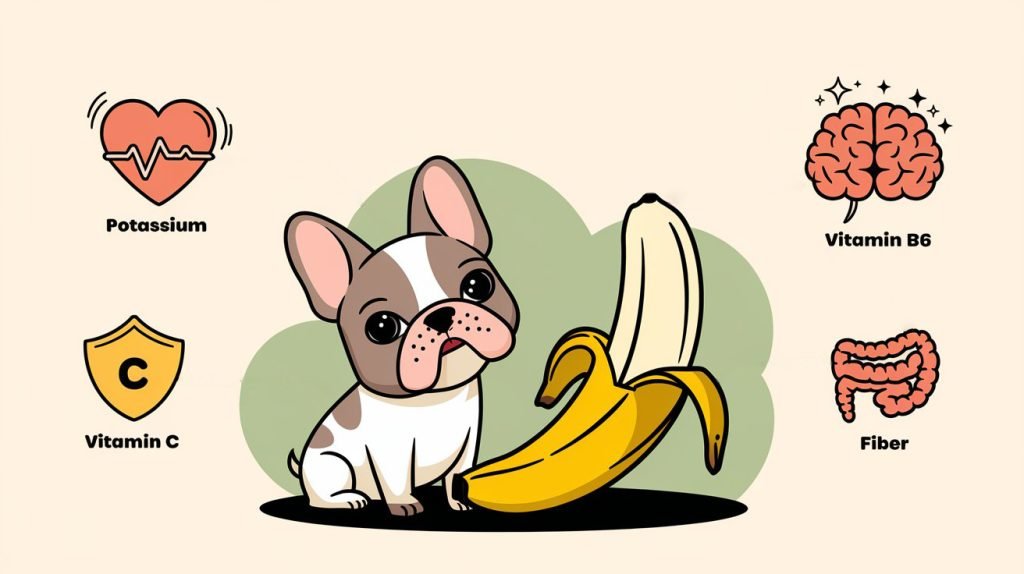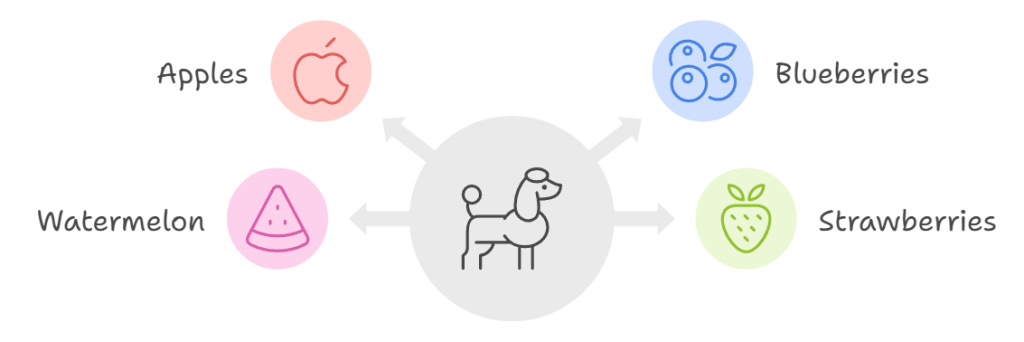As dog owners, we’re all familiar with that look – those big, hopeful eyes fixed on us every time we grab a snack, as if to say, “Can I have some too?” It’s natural to want to share our favorite foods with our furry companions, but not every human food is safe for dogs. When it comes to fruits, we’re especially cautious, and many dog owners wonder, “Can dogs eat bananas?” After all, what’s harmless for us might have unexpected effects on a dog’s digestive system.
This brings us to a common question: Are bananas safe for dogs? Bananas are a delicious, nutrient-packed snack for humans, but are they also good for our four-legged friends? And beyond the banana itself, what about those peels, banana bread, or banana chips? In this guide, we’ll explore each of these options in detail to give you the confidence to safely decide whether bananas should have a place in your pup’s diet.
Can Dogs Eat Bananas?

Yes, dogs can safely eat bananas – in moderation. Bananas are non-toxic and generally considered a safe, nutritious snack for dogs, making them a popular choice among pet owners looking for healthy treat options. Packed with natural sugars, fiber, and key vitamins, bananas can provide a quick energy boost and support your dog’s health when given as an occasional treat.
However, like with any treat, moderation is essential. Too much banana can lead to an upset stomach or contribute to weight gain due to its sugar content. Introducing bananas in small amounts and watching for any unusual reactions is a good approach to ensure that this sweet fruit agrees with your pup.
Recommended Banana Portions for Dogs by Size
| Dog Size | Dog Weight | Banana Portion (grams) | Equivalent Slice |
|---|---|---|---|
| Small Dogs | Up to 10 kg (22 lbs) | 10–15 grams | 1 thin slice |
| Medium Dogs | 10–25 kg (22–55 lbs) | 20–30 grams | About 2 thin slices |
| Large Dogs | 25+ kg (55+ lbs) | 40–50 grams | About 3–4 thin slices or ½ banana |
Key Takeaway: Are bananas safe for dogs? Absolutely, as long as they’re served in appropriate portions.
Nutritional and Health Benefits of Bananas for Dogs

Bananas can be a nutritious and safe treat for dogs when given in moderation, providing a range of nutrients that contribute to their overall health. Here are some of the key benefits:
Key Takeaway: When offered in appropriate portions, bananas provide dogs with essential nutrients that support heart health, muscle function, immune strength, digestive health, and energy.
Risks and Considerations for Feeding Bananas to Dogs

While bananas can be a nutritious treat for dogs, they come with some potential risks. Being aware of these can help ensure that your dog enjoys bananas safely and without any adverse effects.
Potential Health Risks of Bananas for Dogs
Feeding bananas to dogs in excess can lead to several issues:
Key Takeaway: While bananas can be safe, the risks of feeding dogs bananas lie in overconsumption. Serve small portions and monitor your dog for any signs of discomfort.
Special Considerations for Feeding Bananas to Dogs
Some dogs have specific health conditions that make them more sensitive to sugary or high-carb foods.
Key Takeaway: Bananas for dogs with diabetes or other health conditions should only be offered with a veterinarian’s approval. Each dog’s health needs are unique, and your vet can guide you on the safest treats for your pet.
How to Safely Introduce Bananas to Your Dog’s Diet

If you’re curious about sharing bananas with your dog, it’s important to serve them in a way that maximizes safety and enjoyment. Follow these tips to keep banana treats both healthy and fun for your furry friend.
Serving Bananas Safely: Tips for Dog Owners
When feeding bananas to your dog, preparation and portion control are key:
Key Takeaway: Serve bananas in small, bite-sized portions and monitor your dog for any signs of digestive discomfort when introducing this new treat.
Fun and Creative Banana Recipes for Dogs
Make banana treats even more enjoyable by trying these fun, dog-safe recipes:
Pro Tip: Homemade treats like Frozen Banana Bites or Banana Pup Smoothies let you safely introduce variety and fun into your dog’s diet.
Can Dogs Eat Banana Peels?
While banana peels are technically non-toxic, they are not recommended for dogs. Banana peels are thick, fibrous, and challenging for a dog’s digestive system to process. For some dogs, consuming a banana peel could lead to gastrointestinal issues, including an upset stomach, vomiting, or even a blockage in more severe cases.
The fibrous texture of banana peels makes them especially difficult to digest, and the risk is higher in smaller dogs who may be more prone to choking or blockages. Even larger dogs, however, can experience digestive discomfort or obstruction if they consume too much of the tough peel.
Recommendation: Avoid giving banana peels to dogs altogether. If you’re serving your dog a piece of banana, it’s best to peel it first to ensure that they’re only getting the soft, digestible fruit inside.
Key Takeaway: Although banana peels for dogs aren’t toxic, they can be a hazard. To keep your dog safe, stick to peeled bananas in small, controlled amounts.
Can Dogs Eat Banana Bread?
While bananas themselves can be a safe treat for dogs in moderation, banana bread is a different story. Most store-bought and homemade banana bread recipes contain ingredients that are less ideal—and even potentially harmful—for dogs, including:
Recommendation: Can dogs eat banana bread safely? It’s best to avoid giving them store-bought or traditional banana bread due to these added ingredients. If you’re set on treating your dog with banana bread, opt for a homemade, dog-safe version made without added sugars, butter, or harmful ingredients like chocolate or nuts. Even with these modifications, banana bread should only be an occasional treat.
Key Takeaway: The safest choice is to steer clear of regular banana bread and opt for dog-friendly banana treats instead.
Can Dogs Eat Banana Chips?
Banana chips may seem like a convenient treat for your dog, but store-bought varieties can come with some potential health risks. Many commercially available banana chips contain added sugars, oils, or preservatives, which can be problematic for dogs. Added sugar can contribute to weight gain, dental issues, and even diabetes in dogs, while oils and preservatives may cause digestive upset or be harder on a dog’s system over time.
If you’d like to offer banana chips for dogs as an occasional treat, consider making them at home. Homemade banana chips can be prepared without added sugar, oil, or artificial preservatives, making them a safer option. Simply slice bananas thinly and bake them in the oven at a low temperature until they are crispy. This way, you know exactly what’s in the treat and can ensure it’s free of unnecessary additives.
Recommendation: While banana chips for dogs can be safe when homemade and unsweetened, they should still be given in moderation. Always observe your dog for any digestive changes when trying a new treat.
Key Takeaway: Stick with homemade, unsweetened banana chips to keep your dog’s snacks safe, simple, and enjoyable.
Dog-Friendly Fruit Alternatives to Bananas

While bananas can be a great occasional treat, there are plenty of other fruits that offer tasty and nutritious options for your dog. Here’s an overview of some dog-friendly fruits and their benefits:
These fruits provide healthy, low-calorie options that can be given as occasional treats, just like bananas.
Nutritional Comparison of Bananas and Other Dog-Friendly Fruits
The table below compares some essential nutrients in bananas, apples, and blueberries to help you decide which fruits might best suit your dog’s dietary needs:
| Nutrient | Bananas (per 100g) | Apples (per 100g) | Blueberries (per 100g) |
|---|---|---|---|
| Calories | 89 | 52 | 57 |
| Sugar | 12.23g | 10.39g | 9.96g |
| Fiber | 2.6g | 2.4g | 2.4g |
| Vitamin C | 8.7mg | 4.6mg | 9.7mg |
| Potassium | 358mg | 107mg | 77mg |
Key Takeaway: Bananas, apples, and blueberries each offer unique nutritional benefits, making them ideal treats in rotation. Varying your dog’s fruit treats can keep things exciting and provide a broader range of nutrients.
Conclusion
Bananas can be a tasty, nutritious treat for your dog when fed in moderation. Rich in potassium, vitamin B6, fiber, and vitamin C, bananas offer health benefits that support heart function, digestive health, and immune strength. However, moderation is essential; too many bananas can lead to digestive issues or added sugar in your dog’s diet, which is best avoided. Avoid banana peels, banana bread with added ingredients, and store-bought banana chips with additives.
As a responsible pet owner, it’s always wise to consult your veterinarian before introducing new foods or treats, especially if your dog has specific health conditions. With proper guidance and careful portioning, bananas can be a delightful addition to your dog’s treat rotation—just remember, moderation is key when feeding bananas to dogs.
External Links:
https://www.assistancedogs.org.au/news/is-it-safe-for-my-dog-to-eat-banana/
Frequently Asked Questions (FAQs)
Can all dogs eat bananas?
Yes, most dogs can safely enjoy bananas in moderation. However, some breeds or individual dogs may be more prone to digestive sensitivity. For instance, small breeds or dogs with sensitive stomachs may need smaller portions to avoid upset. As always, when introducing any new food, start with a small amount to observe your dog’s tolerance and adjust based on their response.
Is it better to give fresh or frozen bananas?
Both fresh and frozen bananas can be safe for dogs. Fresh bananas are easy to digest, while frozen bananas make a cooling treat for hot days. Just remember to slice them into bite-sized pieces to prevent choking.
How often can I feed my dog bananas?
Bananas are best given as an occasional treat. A few slices once or twice a week is typically enough for most dogs. Larger dogs with higher activity levels may handle slightly larger portions, but be mindful of the natural sugar content and aim to keep treats to 10% or less of their daily caloric intake.
What should I do if my dog eats too many bananas?
If your dog has eaten too many bananas, keep an eye out for symptoms of overconsumption, including diarrhea, bloating, or constipation due to the high fiber content. If symptoms occur, provide access to fresh water, monitor their behavior, and avoid feeding bananas until symptoms subside. In cases of significant discomfort or persistent symptoms, consult your veterinarian for guidance.

